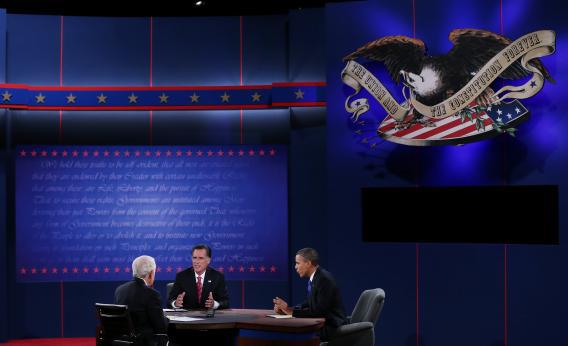The 2012 debates are officially in the history books. The candidates did battle this year at the University of Denver, Centre College in Danville, Ky., Hofstra University on Long Island, N.Y., and Lynn University in Boca Raton, Fla. Why are debates always held on college campuses?
Because they have money. The Commission on Presidential Debates, or CPD, publishes the requirements for host sites nearly two years before the first debate. For this election cycle, the commission required a 17,000-square-foot debate hall with a large parking lot and a media center. Three thousand hotel rooms had to be within 30 minutes’ drive of the hall and spread across at least three hotels but no more than seven. Plenty of convention centers and music theaters meet these criteria, but they fail the CPD’s final test: the ability to raise huge amounts of cash. As any college graduate knows, universities have effective and persistent fundraising machines that can be deployed to pay for a presidential debate. Lynn College, for example, spent $5 million hosting Monday’s presidential debate. Few city governments or theater owners are willing to shell out that kind of money.
College campuses have always been involved in debates, but they only recently came to hold a monopoly. The first televised presidential debate, between Richard Nixon and John F. Kennedy, was held in a studio without an audience because the networks that sponsored the encounter thought broadcasting from a remote location would be too technically challenging. There were no more debates until 1976—the Kennedy-Nixon faceoff spooked campaign strategists. When the debates returned, one of the encounters was held at the College of William and Mary in Williamsburg, Va., and the rest in theaters. After that, theaters and college campuses fought it out fairly evenly for several election cycles, but since 2000 every presidential and vice-presidential debate has been held on a college campus. For the 2012 debates, the only applicants were colleges and universities.
While pecuniary considerations are central, one of the mission objectives of the CPD is public education. Debates on college campuses tend to spawn more lectures and discussions, especially as the universities try to maximize the impact of their investments.
There are also political considerations. The campaigns prefer to debate in swing states like Colorado or Florida, where they can campaign before and after the debate. Long Island, the location for this year’s second presidential debate, probably appealed because of its proximity to New York City, a great place for the campaigns to raise some cash.
Got a question about today’s news? Ask the Explainer.
Explainer thanks Alan Schroeder, author of Presidential Debates: Fifty Years of High-Risk TV.
